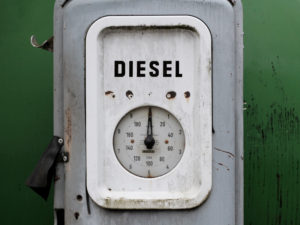Are ‘death of diesel’ warnings premature?
A ‘perfect storm’ for diesel registrations will see their share of the UK new car market slashed radically over the coming year according to new analysis – but fleets are being warned that the writing isn’t on the wall for diesel yet.

Diesel still plays an important role for fleets, according to many in the fleet industry.
According to research by Birmingham’s Aston University, diesel registrations could slump from their previous market share of around 50% to just 15% by 2025.
The warnings follow latest registration figures from the Society of Motor Manufacturers and Traders (SMMT) that show diesel registrations fell 17.1% in 2017 following the ninth consecutive month of downturn, giving them a market share of 42.0% last year compared to 47.7% in 2016.
The downturn was claimed to be the result of ongoing ‘diesel demonisation’ and followed months of speculation over planned diesel tax rises, as announced in the Autumn Budget, as well as forthcoming plans for increased Clean Air Zones, including possible charging.
According to Aston University’s Professor David Bailey, such environmental pressures and ongoing consumer confusion over the ramifications could see diesels suffer another double-digit slump in 2018, as diesels face “a ‘perfect storm’ of bad PR over pollution, coupled with concerns over increasingly strict regulations and sinking second-hand values”.
Professor Bailey also added to calls for a diesel scrappage scheme to help boost the move to electric vehicles: “Governments have missed several opportunities to encourage drivers to switch to electric vehicles, starting way back in 2001 when there was a misconceived drive to get people to opt for diesels. Now that it’s clear diesel is dying a slow death, the time is right for the Government to take the initiative and offer up scrappage benefits to those who are prepared to ditch their diesels and switch to electric cars.”
Yet there are many in the fleet industry who think ongoing conjecture on the death of diesel – including in the wake of the Autumn Budget measures – is overkill and that diesel vehicles still bring many benefits to fleets despite a gradual industry migration to ULEVs.
Speaking to Fleet World, Robert Lea, strategic account development manager, at ALD Automotive, said: “Diesel vehicles have been the workhorse of the UK’s company car market for many years and they will continue to account for a large percentage of the fleet for the foreseeable future. The recent negative press and the new measures brought in during the Autumn Budget do not detract from the fact that they are still, for many fleet managers and drivers, the sensible economic choice. Modern Euro 6 diesels are still favoured by many company car drivers for their impressive fuel consumption and lower CO2 emissions.”
Speaking earlier this week, the RAC also urged for drivers and fleets to make the distinction between latest, Euro 6 diesels and older engines.
RAC Fuel Watch spokesman Simon Williams said: “The newest diesel vehicles coming onto the market now are among the cleanest ever produced and also emit far less carbon dioxide than their petrol equivalents. If businesses are now making a switch to other types of vehicles based on anti-diesel sentiment, which may not have been entirely accurate when it comes to the latest vans and cars, they risk losing out on that cost benefit.”
And Arval has also urged caution for fleets making any knee-jerk decisions on future vehicle choices.
Sean Sadlier, head of consultancy, Arval, said that although the Autumn Budget had given the clearest signal yet that the Government wants to see an electric and autonomous future and that older, more polluting diesels are out of favour, new diesels were left largely untouched, except for a relatively small change to Benefit in Kind taxation.
Sadlier added: “We welcome this measured approach because we firmly believe that diesel has a place in the future of fleet as part of a blended fuel policy, especially for higher-mileage drivers.
“Generally, we are already seeing a rebalancing of diesel and petrol models, and there is a gradual shift towards petrol and alternative fuels and technologies. However, we do not believe that there will be a sudden death of diesel, nor should there be.”
Meanwhile research recently published by TMC shows that both retail and fleet drivers could be impacted by higher fuel prices from any switch away from diesels.
TMC’s analysis of data from more than 8,000 vehicles showed that diesels averaged 49.8mpg in real-world use compared with 36mpg for petrol cars and 41.6mpg for petrol hybrids. The cost of fuel for the diesels in the sample averaged 11.2 pence per mile but petrol averaged 15.2 pence per mile – 35% higher.
For the average diesel driver, switching to a petrol car would add nearly £400 to their fuel bill over 10,000 miles (£1,122 for diesel vs. £1,515 for petrol).
In fact, the ongoing advice for all drivers is to make fuel choices based on considered analysis of the benefits of all the options available.
ALD’s Robert Lea added: “Vehicle and fuel suitability ultimately depend on the individual journey requirements of drivers. In all cases we will support our customers to make an informed decision based on what is most appropriate for their fleet.”
For more of the latest industry news, click here.












